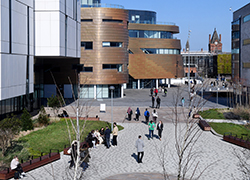Teesside University research contributes to government consultation on energy sales drinks ban
A Teesside University academic whose research has been vital in highlighting the dangerous impact that energy drinks have on children, is urging people to have their say in a government consultation on banning sales to children.

A 12-week public consultation has been announced by the government on proposals to stop retailers selling high-caffeine energy drinks to children under the age of 16.
The move has been influenced by almost a decade of research from academics at Fuse, the Centre for Translational Research in Public Health.
Professor Amelia Lake, Deputy Director of Fuse and Professor of Public Health Nutrition at Teesside University, recently led a comprehensive review looking at data from 57 studies of over 1.2 million children and young people from more than 21 countries.
This, and previous research, strongly links the drinks to negative impacts on children’s physical and mental health, sleep quality, and educational outcomes.
The 12-week consultation is now open - and Professor Lake is urging as many people as possible to share their views.
Professor Amelia Lake, Deputy Director of Fuse, the Centre for Translational Research in Public Health, and Teesside University Professor of Public Health Nutrition, said: “Our research has shown the significant mental and physical health consequences of children drinking energy drinks. We have reviewed evidence from around the world and have shown that these drinks have no place in the diets of children.
“We know these drinks are part of youth culture and associated with sports, gaming, music and more, but there is a lack of clear signalling about their health consequences. Other countries have age-restricted sales of energy drinks - Norway recently announced their restrictions starting in 2026.
“I welcome the consultation, and encourage everyone, especially parents, school workers, health professionals and importantly young people to respond and have their voices heard. It will be a step forward in prioritising the health and wellbeing of our young population.”
The ban is backed by parents, teachers and teaching unions, who report on pupils being unable to concentrate and focus and even negative effects on grades and academic performance.
In a survey by the Department for Education in December 2024, 82% of parents reported feeling concerned about the potential negative effects of high-caffeine energy drink consumption on children. Of teachers surveyed, 61% agreed or strongly agreed that the consumption of high-caffeine energy drinks negatively impacts the health and wellbeing of pupils at their school.
The consultation will run for twelve weeks, closing on 26 November 2025.
 Teesside University shortlisted for prestigious University
...
Teesside University shortlisted for prestigious University
... Teesside University research contributes to government
...
Teesside University research contributes to government
... International partnership to drive net zero innovation
International partnership to drive net zero innovation